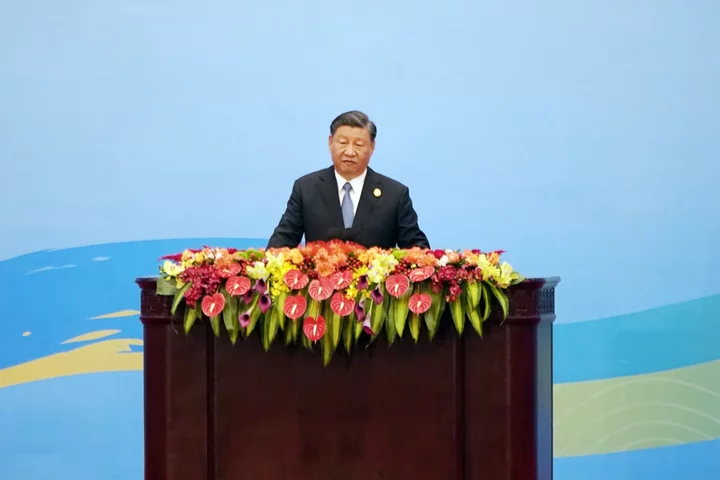Delegates from developing nations are leaving meetings in China this week with grand promises of aid for green energy projects, though there are few concrete projects so far.
Whether from Caribbean countries to colder, landlocked locales, leaders were consistent in their messages at the Belt and Road Forum in Beijing: Their nations are being ravaged by climate change, and China is in a unique position to help as the world’s largest producer of everything from solar panels to batteries.
In response, President Xi Jinping pledged to implement green investment standards to his signature development finance initiative, now officially entering its 11th year. Vice President Han Zheng said China will strengthen financing for environmentally friendly developments and encourage companies to carry out more low-carbon projects in partner countries.
Delegates signed $97.2 billion worth of deals across a handful of sectors including clean energy, Xi said Wednesday, but there’s been scant public information about the nature of any of the deals, or how much has been allocated across sectors.
“There’s less discussion of specific projects,” said Raffaello Pantucci, a senior fellow at the S. Rajaratnam School of International Studies in Singapore. “It seems to be a broad celebration rather than something very concrete being announced.”
Until recently, China’s overseas investments have been characterized by heavy spending on major infrastructure, including for fossil fuels. Of the $235 billion committed to energy projects between 2008 and 2021, two-thirds was allocated to fossil fuel infrastructure and coal-fired power plants, according to Boston University’s Global Development Policy Center.
Read More: Xi’s $1 Trillion ‘Project of the Century’ Gets a Reality Check
A greener Belt and Road has garnered support from foreign governments, especially western nations, who have been critical of China’s lending programs. Fewer foreign leaders attended this week relative to the previous two summits, and Italy, the initiative’s only Group of Seven member, has said it will exit this year.
The focus on sustainability “was a very strategic decision as a bridge-builder in some ways,” said Christoph Nedopil Wang, director of the Griffith Asia Institute.
The need is also great. A UN-led coalition of rich, western countries has so far failed to deliver on a promised $100 billion-a-year fund to support climate initiatives in developing nations. And as of now, Nedopil Wang said, “many BRI projects still don’t apply stringent environmental or social standards, to the detriment of local sustainable development.”
Among the few announcements of new deals reached as of Wednesday, China signed a free trade pact with Serbia during the forum, with the East European country agreeing to gradually cut tariffs for China’s solar panels and lithium batteries to zero.
Chinese manufacturers have already been scouting overseas sites for clean tech factories. During the forum, Trina Solar Co. and TCL Zhonghuan Renewable Energy Technology Co. both signed deals for new Middle East manufacturing sites.
Chinese companies can benefit from growing demand for solar and wind equipment, particularly in places where governments are still working to deliver electricity consistently to everyone, said Damilola Ogunbiyi, Special Representative of the UN Secretary-General for Sustainable Energy for All. If China’s clean energy manufacturers also build factories in those countries, it will diversity the supply chain and bring economic benefits in host countries.
“No one can run away from net zero now,” she said. “China sees this as an economic opportunity.”
--With assistance from Jing Li and Rebecca Choong Wilkins.

